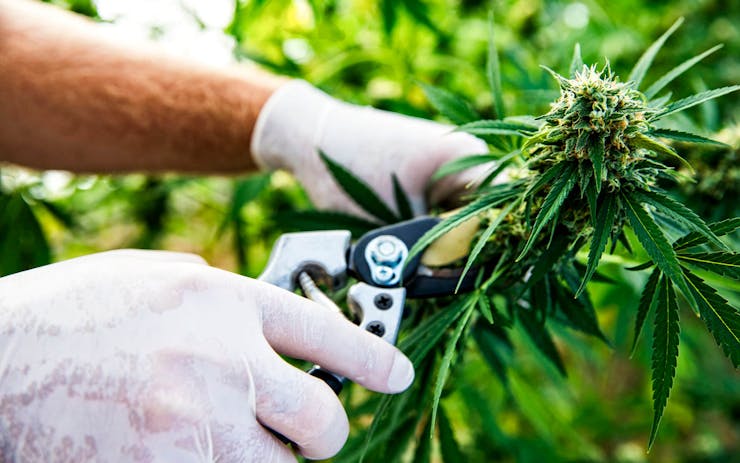As Canada approaches its first summer of cannabis legalization, more growers, producers, and breeders are stepping into the light, sharing their experiences and observations on the evolving production sector.
While the cultivation of cannabis isn’t new in Canada, the new legal landscape has brought about real change and remains an exciting enterprise for those who are growing and adapting to the ever-changing needs of the public.
We spoke to three farmers from across the nation and asked them to share their thoughts on this versatile resource and its future potential in Canada.Join the Leafly Canada Community
Mark Spear, Ottawa, ON
Burnstown Farms Cannabis Company
Even in 2004, Mark Spear explains that it was really difficult to find a consistent supply of cannabis, let alone high-quality stuff at a reasonable price.
“There wasn’t really a lot of selection, and you certainly didn’t have the option of choosing a high-CBD strain,” he explains to Leafly via phone. In the early 2000s, Spear always had questions in the back of his mind.
“You’re not always sure if they sprayed [the cannabis] with pesticides. Were they using a fertilizer that had plant growth regulators that could have a negative impact on your health?”
He mentions that while he never had a problem in the illicit market, a number of people he knows did. Now within a regulated system, Spear explains that “Everything has to be lab tested, and a lot of producers are even making those lab tests available to consumers. So […] there’s the peace of mind from that point of view.”
While back in the day, there wasn’t the selection of genetics there is today, Spear comments:
“You’d be lucky to have, you know, four options to choose from. These days it’s gotten a lot better.” While he notes that a lot of strains still aren’t verified, he believes it’s getting to a point where, if you’re growing a certain cultivar and someone sends it back to the lab to analyze it, it will likely be what it says it is.
“A lot of the genetics in that system today came from MMAR, so personal medical growers back in 2013. Health Canada allowed a one-time window for new licensed producers to bring in genetics from personal medical growers,” noting that there are some packs of seeds out there in their original packaging, but other times it is just a bag of seeds.
We also discussed how quite a few producers have been renaming strains. Spear explains that there are a few reasons producers are doing it.
“A lot of the strain names aren’t very appealing to new users. But I think the bigger reason is, there’s a whole issue going on right now [with] the rights of plant breeders and proprietary genetics.”
Travis Lane, Victoria, B.C.
Co-founder and Cultivation Specialist of Levity Solutions; Founding Director of BC Independent Cannabis Association
When we look back on sort of the historical way it’s worked in British Columbia, Travis Lane explains that most cultivation was done in a closet or a basement, so a lot has changed since then.
“I mean, it’s just night and day. If you told 20-year old me that Canada would be legalizing cannabis 20 years from now, I probably would have laughed in your face.” But of course, he recognizes the challenges that have come with a legalized industry. Lane has seen a big influx of institutional money, stock market money, and retail investment money, and feels like this funding has changed how many companies operate.
“In the old days, in the [illicit] market, everything was word of mouth. Your reputation meant everything.” If your product was good, you could make a significant pay increase. Lane explains that for the cannabis community in British Columbia, they specifically developed complex shipping, delivery, and retail storefronts while living through an era of non-enforcement.
“We essentially developed an underground economy, and wanted it to be legalized.”
But Lane believes that now that we’re finally legalized, we’re seeing that a lot of the tactics used under the illicit system are either no longer necessary or being marginalized.
“I do see some problems with the way the government has handled it. The Government of Canada has never declared cannabis as a medicine despite having a medicinal cannabis program. So, now there are things like excise tax, which is usually called a sin tax, being applied to people’s medicine.”
Lane believes that will be one of those things that still needs to be figured out, as we see a drastic policy change from the government. He notes, “it’s going to take more than six months or even a year for us to sort out all these problems, particularly with the supply chain.”
Lane feels like the government could have easily tracked all the product from producer to retailer without having to step in and possess it themselves or regulate it themselves.
“It’s that extra staff on the supply chain not only creating inefficiencies and delayed time to market, but it also increases overall costs of bringing the product to market, which is going to make it more difficult to compete with [illicit] market interests that don’t have to deal with that convoluted supply chain.”
Che’ LeBlanc, Salamo, BC
Founder and CEO, Rosebud Cannabis Farms
“Because cannabis production has been illegal, breeding has been kind of happening behind closed doors,” shares Che’ LeBlanc with Leafly. Because of that closed-door policy, LeBlanc admits most people seem focused only on the THC percentages on the packages, which he believes has led to some real issues.
“Cultivars that are prone to pathogens and also hermaphrodite ideation: this is quite common in today’s genetics.” Another issue that LeBlanc brings up is that plant compounds are being ignored, specifically CBD.
“Of course, as we all know, all of these [compounds] have real value for the medicinal market. They all work symbiotically together through the entourage effect. But I think that’s been ignored for, for the most part.”
LeBlanc tells Leafly that many seasoned consumers would agree—the cannabis of the past was actually stronger than today’s high-THC cultivars.
“I think consumers are going to become aware of this as time goes on.” He notes that people need to stop paying such close attention to the THC percentage on packages, as they don’t necessarily reflect the intensity or the quality of effect.
“Things like terpene profiles will be getting more attention and will help when deciding what strains to purchase or potentially grow. A lot of these modern strains were basically breeding hybrids, the hybrids that were poly-hybrids.”
This is another downfall LeBlanc shares: we’ve sort of ended up with several strains containing a muddled terpene profile; a mix of so many different genetics in one fruit salad that it becomes difficult to pick out any specific flavours.
“There’s also a lot of variation in seeds produced with these poly-hybrids because we’re working with such a large gene pool. So for these reasons, I’m predicting that we’ll be working with older genetics and landrace genetics and we think this is going to become the future of breeding projects.”ok






